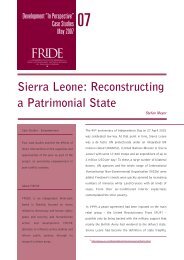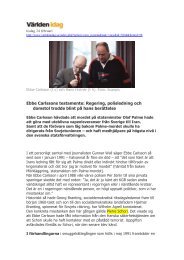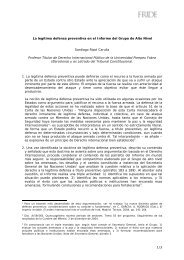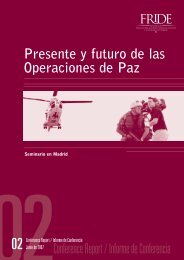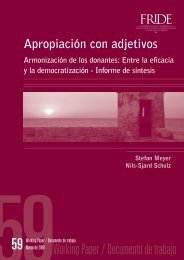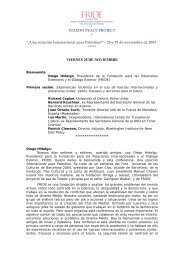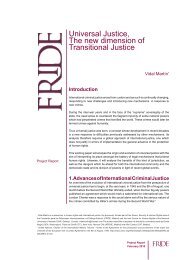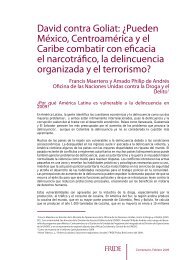Quick Fix or Quicksand? Implementing the EU Sahel Strategy - FRIDE
Quick Fix or Quicksand? Implementing the EU Sahel Strategy - FRIDE
Quick Fix or Quicksand? Implementing the EU Sahel Strategy - FRIDE
You also want an ePaper? Increase the reach of your titles
YUMPU automatically turns print PDFs into web optimized ePapers that Google loves.
4<br />
WORKING PAPER 114<br />
In this sense, SSR eff<strong>or</strong>ts have emerged as a policy pri<strong>or</strong>ity to bridge <strong>the</strong> security sh<strong>or</strong>tfalls<br />
in <strong>the</strong> strategy’s initial approach. A civilian CSDP mission was deployed to Niger in <strong>the</strong><br />
summer of 2012. <strong>EU</strong>CAP SAHEL Niger is expected to last two years with an estimated<br />
budget of around €8.7 million in its first year. The mission is mandated to streng<strong>the</strong>n <strong>the</strong><br />
capacity of Niger’s security f<strong>or</strong>ces to counter <strong>the</strong> threats of terr<strong>or</strong>ism and <strong>or</strong>ganised crime<br />
via training, ment<strong>or</strong>ing and advising. AQIM’s repeated attacks on European citizens and<br />
interests in Niger have long demonstrated <strong>the</strong> government’s weak capacity vis-à-vis <strong>the</strong><br />
Islamist threat. 14 Following <strong>the</strong> Niger deployment, <strong>the</strong> F<strong>or</strong>eign Affairs Council of 15<br />
October requested that <strong>the</strong> planning of a military CSDP operation be pursued, with a<br />
view to deploying 150 seni<strong>or</strong> military trainers to help re<strong>or</strong>ganise <strong>the</strong> Malian army.<br />
These country-based deployments are modelled on <strong>the</strong> well-tested SSR f<strong>or</strong>mat, ra<strong>the</strong>r<br />
than an armed counter-terr<strong>or</strong>ism <strong>or</strong> stabilisation mission. 15 However, <strong>the</strong>re are concerns<br />
that <strong>the</strong> missions are too small to be effective. <strong>EU</strong>CAP SAHEL Niger will comprise<br />
fifty international staff at full operational capacity, most of <strong>the</strong>m civilian judicial and<br />
police experts embedded within <strong>the</strong> <strong>EU</strong> delegation. Because of <strong>the</strong>ir limited scale<br />
and piecemeal approach, it is also not clear exactly how <strong>the</strong> Niger mission and <strong>the</strong><br />
envisaged operation in Mali will link up with enf<strong>or</strong>cement actions currently being<br />
contemplated by sub-regional act<strong>or</strong>s within ECOWAS.<br />
Despite <strong>the</strong> Task F<strong>or</strong>ce <strong>Sahel</strong>’s eff<strong>or</strong>ts, serious blind spots continue to limit <strong>the</strong> impact<br />
of <strong>the</strong> strategy. One maj<strong>or</strong> challenge has been <strong>the</strong> difficulty f<strong>or</strong> <strong>the</strong> EEAS to fulfil its<br />
expected co<strong>or</strong>dination role of <strong>the</strong> overall European presence and action in <strong>the</strong> region.<br />
In particular, France and to a lesser extent a number of o<strong>the</strong>r <strong>EU</strong> member states with<br />
imp<strong>or</strong>tant interests in <strong>the</strong> region often operate in parallel to <strong>the</strong> Union. In France’s<br />
case, <strong>the</strong> country has been trying to ‘Europeanise’ its eff<strong>or</strong>ts by pushing f<strong>or</strong> CSDP<br />
missions in Niger and Mali. Never<strong>the</strong>less, Frances’s role in <strong>the</strong> <strong>Sahel</strong> has also been<br />
one of <strong>the</strong> greatest obstacles to securing comprehensive regional backing f<strong>or</strong> <strong>the</strong> <strong>EU</strong><br />
strategy. F<strong>or</strong> example, Algeria distrusts France and oftentimes equates French positions<br />
to those of <strong>the</strong> <strong>EU</strong>. Beyond Algeria, France’s hyperactive diplomatic role in <strong>the</strong> <strong>Sahel</strong>,<br />
its ubiquitous and often complex ties to various regional act<strong>or</strong>s and its role as virtual<br />
spokesperson f<strong>or</strong> <strong>the</strong> <strong>EU</strong> in <strong>the</strong> high politics of Malian crisis diplomacy at <strong>the</strong> UN<br />
Security Council (UNSC) have entrenched this impression.<br />
It is also questionable whe<strong>the</strong>r <strong>the</strong> <strong>EU</strong>’s broad objectives in terms of weakening<br />
extremist f<strong>or</strong>ces and helping to rebuild regional states’ capacities have been helped<br />
by specific actions of individual <strong>EU</strong> member states. This is illustrated f<strong>or</strong> example by<br />
<strong>the</strong> controversial Spanish-Italian decision to pay ransom to Islamist insurgent groups<br />
in n<strong>or</strong><strong>the</strong>rn Mali in July 2012 to secure <strong>the</strong> release of aid w<strong>or</strong>kers kidnapped by Al-<br />
Qaeda affiliated groups. Both <strong>the</strong> EEAS and <strong>the</strong> Commission remained silent amidst<br />
criticisms of <strong>the</strong> ransom payment. It would appear that regardless of <strong>the</strong> concerted<br />
eff<strong>or</strong>ts going into <strong>the</strong> strategy implementation, <strong>the</strong> long-running search f<strong>or</strong> a coherent<br />
<strong>EU</strong> approach to <strong>the</strong> <strong>Sahel</strong> continues. 16<br />
14. ‘<strong>EU</strong>CAP SAHEL Niger’, <strong>EU</strong> Common Defence and Security Policy (CSDP), 16 Jul 2012. Available at: http://www.consilium.europa.eu/eeas/<br />
security-defence/eu-operations/eucap-sahel-niger?lang=en<br />
15. The <strong>EU</strong>NAVFOR deployment to tackle piracy off <strong>the</strong> Somali coast and <strong>the</strong> Indian Ocean is distinct in that it is a sea-based, enf<strong>or</strong>cement operation<br />
to complement o<strong>the</strong>r multinational f<strong>or</strong>ces present in <strong>the</strong> Indian Ocean.<br />
16. Thomas Renard, Terr<strong>or</strong>ism and o<strong>the</strong>r Transnational Threats in <strong>the</strong> <strong>Sahel</strong>: What Role f<strong>or</strong> <strong>the</strong> <strong>EU</strong>?, Brussels: Centre on Global Terr<strong>or</strong>ism Cooperation, 2010, p.5.



